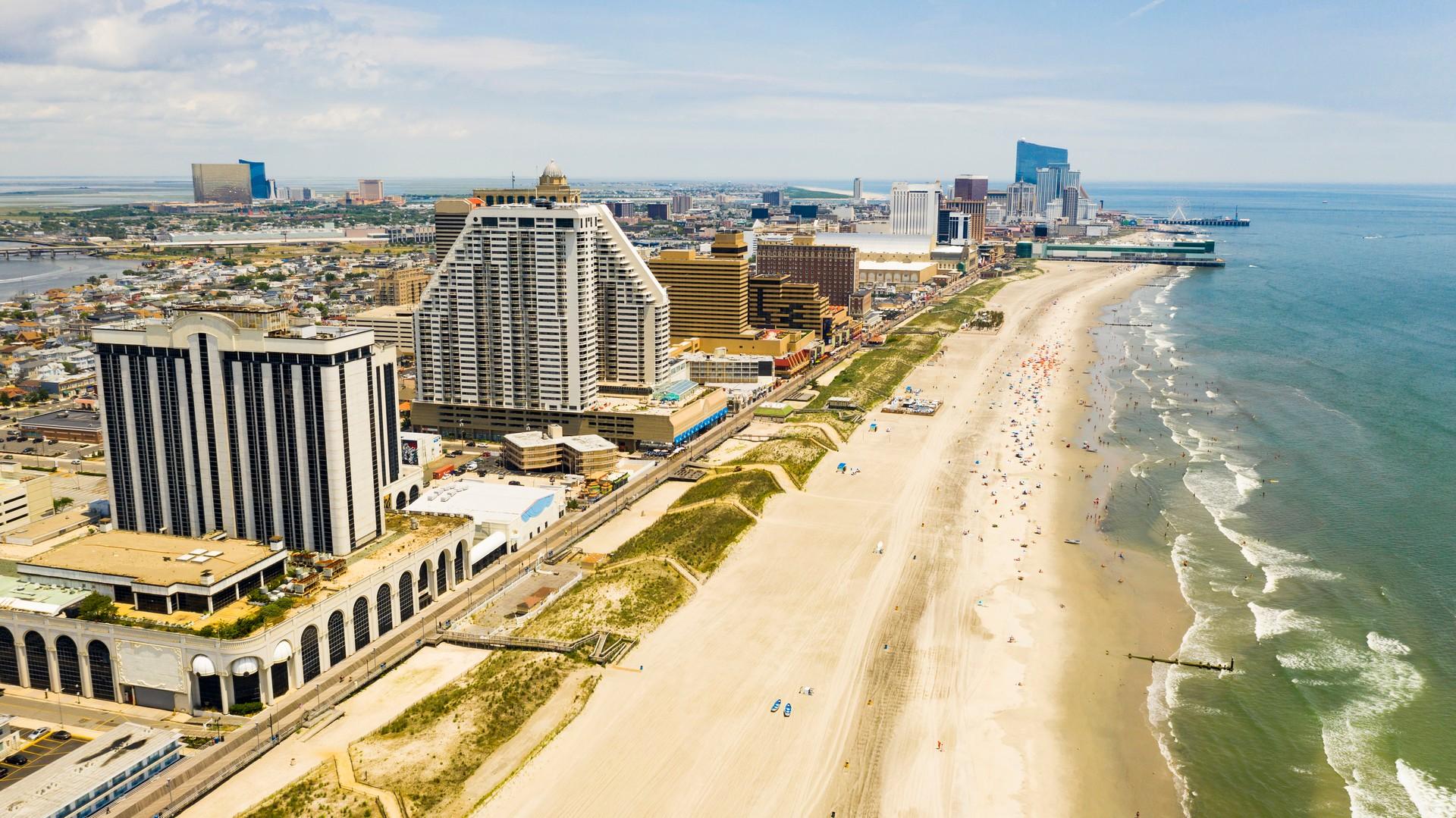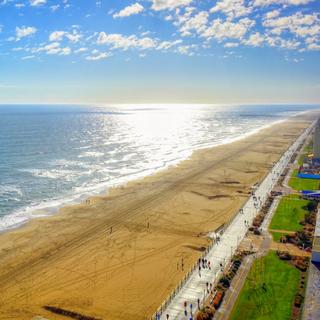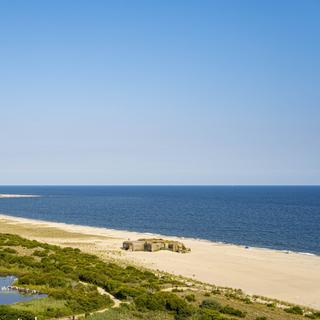
Atlantic City weather and climate in 2025

Atlantic City weather and climate in 2025
Day
28 °C
Night
20 °C
Sea
22 °C
Precipitation
94 mm
in month
Rainy days
9 days
in month
Daylight
14 hours
average
Sunshine
9 hours
average
Humidity
74 %
Weather charts for Atlantic City

Find more destinations like this
Destinations with similar weather to Atlantic City
Other destinations in Delaware
Closest cities for Atlantic City
Weather overview for Atlantic City
Weather overview
Renowned for its majestic coastal beauty, Atlantic City, situated in the United States, experiences a moderate continental climate characterized by seasonal temperature fluctuations. Daytime temperatures span a broad spectrum, ranging from an average low of 6 °C (42 °F) in the chilly month of January to a summer peak of 28 °C (83 °F) in the blissful month of July. Furthermore, night-time temperatures typically hit their zenith in July, reaching a mild 20 °C (68 °F), while the tranquility of January brings the lowest temperatures, with the mercury dropping to -3 °C (26 °F). Marine enthusiasts will appreciate the seawater temperatures that fluctuate from a minimum of 4 °C (39 °F) in the icy waves of February to a pleasant 23 °C (74 °F) in August's welcoming embrace. The patterns of precipitation reveal October as the driest period, having only 8 days of rain, whereas December stands out as the wettest month with 11 days of rain.
January weather
January initiates with minimum daytime temperatures averaging 6 °C (42 °F) in Atlantic City, paired with a noticeable decline in sea temperatures. Crisp night temperatures are at their lowest, averaging -3 °C (26 °F). The fledgling increase in sunshine hours, now averaging 5 hours, is a subtle hint at the lengthening days. The winds blow strongest now, reaching an average speed of 5 m/s, while rainfall tends to decrease to an average of 83 mm (3.25 in).
February weather
February's stark cold waters boast the year's coldest average sea temperature at 4 °C (39 °F) in Atlantic City, and a promising increment in daytime temperatures to an average of 7 °C (44 °F). The nights are still frosty but slightly warmer, averaging -2 °C (28 °F). A continual increase in sunny hours, now averaging 6 hours, hints at the coming spring. Rainfall amounts remain minimal, averaging 75 mm (2.97 in).
March weather
March witnesses an uptick in daytime temperatures, now averaging 11 °C (51 °F), while the sea temperature gently rises. The continuing trend in nighttime temperature increment is marked with an average of 1 °C (34 °F). An upward trajectory in both sunshine and precipitation is evident, with averages of 7 hours and 107 mm (4.23 in) respectively.
April weather
April's warming trend persists, with average daytime temperatures reaching 16 °C (60 °F), alongside a comfortable upsurge in sea temperatures averaging 8 °C (47 °F). The reduction in rainfall begins to emerge this month. Nights get progressively warmer, averaging 6 °C (43 °F). The increase in sunny hours continues, now averaging 7 hours, and this month celebrates the lowest levels of humidity noticed in the yearly cycle.
May weather
May ushers in an escalation of both sea and daytime temperatures, averaging 13 °C (55 °F) and 21 °C (69 °F) respectively. The night remains temperate, with an average temperature of 11 °C (52 °F). Rainfall trends downward while sunny hours increase, now averaging 8 hours.
June weather
The cusp of summer in June is exemplified by a significant rise in daytime temperatures to an average of 25 °C (78 °F), while the continuing temperate sea waters average 18 °C (65 °F). The descent in rainfall is in line with previous months, averaging 78 mm (3.08 in). Nights grow milder, now averaging 17 °C (63 °F). As the vacation season draws near, the zenith of sunny hours is reached, averaging 9 hours.
July weather
Tourism thrives in July as sea temperatures ascend to a balmy average of 22 °C (72 °F), and daytime temperatures hit their yearly zenith. The nocturnal temperatures peak too, with an average of 20 °C (68 °F). As rainfall begins its descent, the frequency reduces to an average of 9 days. The wind calms to a gentle breeze, averaging 4 m/s.
August weather
August presents the paramount sea temperatures averaging 23 °C (74 °F), while daytime temperatures slightly recede to an average of 28 °C (82 °F). The increase in rainfall is observed with an average of 106 mm (4.18 in). The night temperatures initiate their decline, averaging 20 °C (67 °F). Humidity is at its highest annual level in this month.
September weather
September marks a continuation of the tourist season with a subtle decrease in daytime temperatures to an average of 25 °C (76 °F), while sea temperatures begin their annual retreat at an average of 22 °C (71 °F). The diminishing number of rainy days becomes evident, now averaging 8 days, along with a general decline in precipitation which averages 81 mm (3.19 in). Night temperatures cool, averaging 16 °C (60 °F).
October weather
October's air is brisk, with a continuation in the decline of daytime temperatures to an average of 19 °C (67 °F), and the sea temperature follows suit, averaging 18 °C (64 °F). The frequency of rainy days is at its annual low, averaging 8 days, and precipitation begins its upward trend, now averaging 88 mm (3.47 in). Nighttime temperatures also continue to fall.
November weather
The chill is more pronounced in November with both sea and daytime temperatures on a downward spiral, now averaging 13 °C (56 °F) and 14 °C (57 °F) respectively. The advent of the rainy season reemerges with an increased number of wet days. Night temperatures dip further, averaging 5 °C (40 °F). The sunshine duration contracts, with an average of 5 hours.
December weather
December announces the closing of the year with a continued decline in sea temperatures, averaging 9 °C (48 °F), and the daytime temperature also decreases to an average of 8 °C (47 °F). The peak in the rainy season manifests as the maximum number of wet days, averaging 11 days. The scarce sunshine hours, now averaging 4 hours, and shortest day lengths, averaging 9 hours, are the hallmarks of a typical winter month.
FAQs
What average wind speeds can be encountered in Atlantic City in January?
January sees the strongest average winds in Atlantic City, reaching 5 m/s
How long can the sun be expected to shine in February in Atlantic City?
In February, Atlantic City enjoys an average of 6 hours of sunshine daily.
Is March the wettest month in Atlantic City?
No, while March sees significant rainfall in Atlantic City with an average of 107 mm (4.23 in), it is not the wettest month.
What changes occur in Atlantic City's humidity levels in April?
April sees the lowest humidity levels of the year in Atlantic City, offering a more comfortable climate.
How does Atlantic City's climate change moving from spring into May?
Transitioning into May, Atlantic City experiences higher temperatures, both in the sea and the air, and enjoys extended daylight hours.
Is it hot in June in Atlantic City?
June in Atlantic City offers mostly warm and agreeable weather, often feeling hot, especially in direct sunlight.
What is the temperature in Atlantic City during the day in July?
During July, Atlantic City basks in the highest average daytime temperatures of around 28 °C (83 °F).
Is August part of the wet season in Atlantic City?
Despite the rise in rainfall, Atlantic City does not experience a wet season in August, averaging only 9 days of rain.
What is the sea temperature in Atlantic City in September?
In September, visitors can find Atlantic City's sea temperature comfortably averaging 22 °C (71 °F).
How many rainy days can I expect in Atlantic City in October?
In October, Atlantic City experiences its lowest frequency of rainy days, with an average of approximately 8 days.
What characterizes the weather in Atlantic City in November?
November in Atlantic City is cooler with more rainy days and shorter periods of sunshine, signifying an approach towards winter.
How does Atlantic City's day length vary in December?
December experiences the shortest days in Atlantic City, with daylight lasting for only about 9 hours on average.











